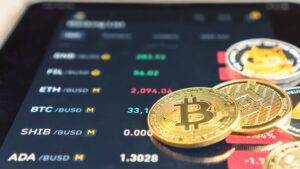Bitcoin trading requires a solid grasp of market trends, technical analysis, and the intricate interplay between risk management and human psychology.
Being a decentralized and volatile cryptocurrency, Bitcoin offers both challenges and opportunities for traders. Grasping the psychology of Bitcoin trading is essential for making informed decisions and navigating the turbulent waters of the crypto market. For excellent investing experience, it is advised to learn about it! Visit immediate-access.org and learn investing from professionals.
The Nature of Bitcoin and Its Volatility
Bitcoin, born out of the desire for a decentralized digital currency, is characterized by its volatility. The cryptocurrency’s price movements can be influenced by a myriad of factors, including market sentiment, regulatory developments, and technological advancements. Understanding the historical patterns of Bitcoin’s volatility provides traders with valuable insights into potential future trends.
Bitcoin’s decentralized nature means that its value is not directly tied to traditional financial indicators, making it susceptible to abrupt and unpredictable price swings. Market sentiment, often driven by news and social media, can trigger rapid fluctuations, reinforcing the importance of closely monitoring external factors affecting the cryptocurrency market.
Understanding Risk in Bitcoin Trading
In the realm of Bitcoin trading, risks abound, ranging from market volatility to regulatory uncertainties and security threats. Cryptocurrencies operate in a relatively young and evolving market, making them particularly susceptible to sudden and substantial price changes. Traders must grasp the multifaceted nature of risks associated with crypto investments.
Market risks stem from the inherent volatility of Bitcoin prices. Traders should be aware of the potential for significant gains as well as substantial losses. Regulatory risks, on the other hand, involve changes in government policies and legal frameworks that can impact the legality and adoption of cryptocurrencies. Security risks encompass the vulnerabilities of online platforms and the threat of hacking, emphasizing the need for secure and reputable trading platforms.
Emotional Factors Influencing Bitcoin Traders
Emotions play a pivotal role in the decision-making process of Bitcoin traders, often leading to both rational and irrational choices. Psychological biases, such as fear and greed, can significantly impact trading decisions. Fear may lead to selling assets prematurely, while greed can drive excessive risk-taking. Traders should be aware of these biases to make informed and rational decisions.
Cognitive dissonance, the discomfort arising from conflicting beliefs and actions, can cloud judgment in the world of Bitcoin trading. Traders may ignore warning signs or cling to losing positions due to an emotional attachment to their initial decisions. Social media exacerbates these emotional responses, amplifying market sentiment and potentially leading to herd behavior among traders.
Strategies for Managing Emotional Responses
Effective strategies for managing emotional responses are paramount in the volatile world of Bitcoin trading. Developing a comprehensive trading plan, including predefined entry and exit points, helps traders stay disciplined and focused. Setting realistic goals and expectations prevents emotional reactions to short-term market fluctuations.
Utilizing stop-loss orders and risk mitigation techniques is essential for protecting investments from significant losses. These tools automate the exit strategy when predefined thresholds are reached, allowing traders to limit potential damages. Emphasizing a systematic and disciplined approach helps mitigate the impact of emotions on trading decisions.
Case Studies and Examples
Analyzing the experiences of successful traders and examining common mistakes provides valuable lessons for navigating the emotional complexities of Bitcoin trading. Successful traders often exhibit emotional intelligence, maintaining composure in the face of market volatility. On the contrary, examining the missteps of others highlights the consequences of succumbing to emotional biases and making impulsive decisions.
Notable Bitcoin market events, such as major price corrections or regulatory developments, offer valuable insights into the emotional dynamics at play. Learning from these case studies can equip traders with the knowledge needed to navigate similar situations and make informed decisions.
The Future of Bitcoin Trading and Emotional Intelligence
As technology continues to advance, the future of Bitcoin trading is likely to bring new opportunities and challenges. Regulatory changes, technological innovations, and shifts in market dynamics will impact the cryptocurrency landscape. Adapting to these changes requires a high level of emotional intelligence, allowing traders to remain agile and make sound decisions in the face of uncertainty.
The evolving regulatory environment may influence market behavior and investor sentiment. Traders who possess emotional resilience and adaptability will be better positioned to thrive in this dynamic environment. Continuous learning and staying abreast of market trends are essential for navigating the ever-changing landscape of Bitcoin trading.
Conclusion
In conclusion, understanding the psychology of Bitcoin trading is essential for success in this complex and unpredictable market. Traders must navigate the volatility of Bitcoin prices while managing the emotional complexities that can cloud rational decision-making. By comprehensively grasping the nature of Bitcoin, recognizing and mitigating risks, and developing strategies to manage emotional responses, traders can enhance their chances of success in the dynamic world of cryptocurrency trading. As the market continues to evolve, maintaining emotional intelligence will be a key factor in adapting to new challenges and opportunities.
Read more:
Managing Risk and Emotions: The Psychology of Bitcoin Trading
















